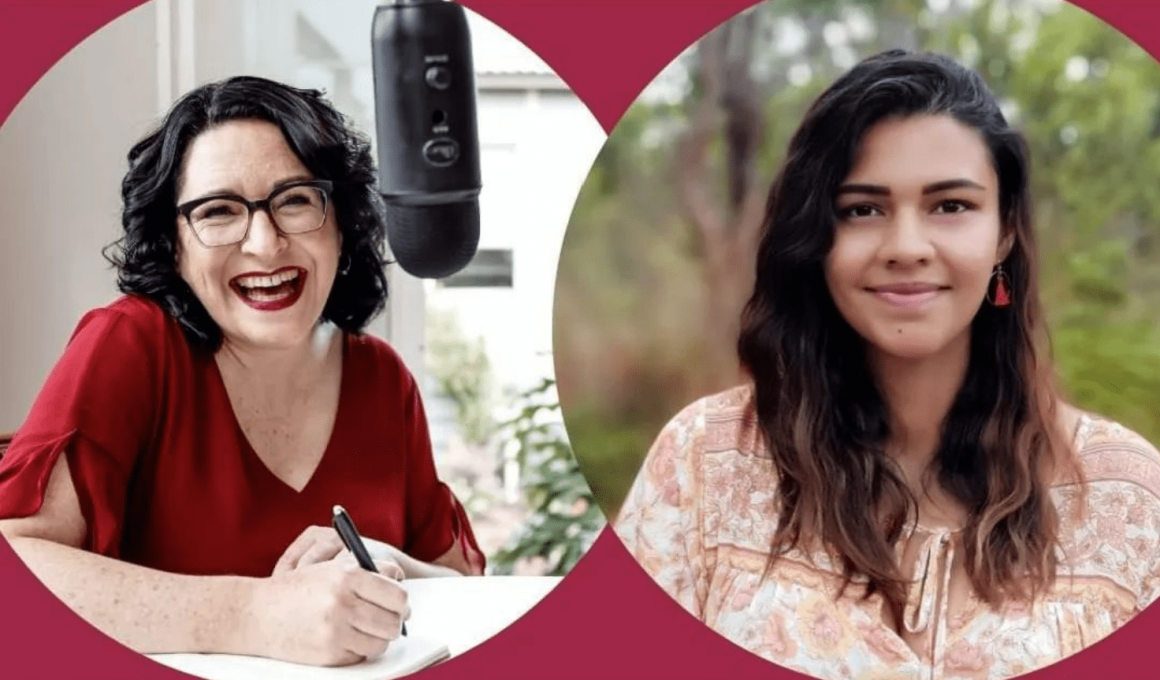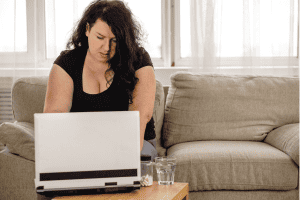This blog post is a transcript of the podcast interview between Aimee Heinrich and Nikola Willis, for The Small Business Podcast.
Top 4 tips for maintaining your mental health in small business ownership (Episode #39)
Nikola: [00:00:00] Good afternoon and welcome to the Small Business Cheerleader Podcast. I’m Nicola Willis from Marketing The Small Business Cheerleader. And I’m joined today by Fiona Rogerson, Trauma and Perinatal Counsellor. How are you today?
Fiona: [00:00:12] I’m really well. Thank you for having me here.
Nikola: [00:00:15] No problems. We are going to be talking about all things work, life balance, maintaining a healthy lifestyle. Lots of things that small business owners can listen to and take away and start to implement into their lives today. I really want to know how you got to where you are working as a trauma and perinatal counsellor. What’s the background behind that and fill us in.
Fiona: [00:00:37] Okay, sure. Part of my work is to offer specialist counselling to men and women in all areas of trauma, PTSD, recovery, perinatal difficulties, really with a birth trauma focus. I work with all sorts of individuals. I teach hypnobirthing, I work with lots of organisations in the area of training around trauma informed care, so really widespread. It all began in 2007 with the birth of my first child, which quickly propelled me into wanting something for myself after having given myself to a little baby for so long. In 2009, I entered the world of photography and it kind of just fell in my lap, realised I was good at it and built a business around that. So it all began back then, and within that journey of professional photography, I got to experience what it was like to work with other parents and from then it was just a progression. It was a lot of pivoting around what would work best for my family. I had two boys that would follow and so the photography led from that into becoming a birth doula and post-natal doula, then a childbirth educator, and then going back to uni and becoming a counsellor. So that’s where I am now, all those years later.
Nikola: [00:02:01] I love that I did an IG live just a few weeks ago on pivoting in small business because I know that something, especially in this day and age, that small business owners have to be adept at. And I find that female small business owners in particular tend to be able to pivot on a dime when needed to, and usually towards something that lights them up. And that’s what I love most about it. We tend to always gravitate in the end towards whatever it is that lights is up. And for you to be able to find that as part of your journey as a small business owner is just amazing, especially helping women as a dollar and then knowing that you can go back, find out more and become skill set in helping them as a counselor. And I think that that is just an amazing pivot. So how have you found that so far in this new realm? And and how is it growing for you as as a business owner?
Fiona: [00:02:54] Yeah, it’s been really interesting. It’s been an interesting journey. And as you said, it’s finding something that’s really in alignment, but also something that really does you know, it really aligns with what we’re talking about today, mental health in terms of building a business that really works around your mental health, not the other way around. Being able to sustain a healthy relationship with the people around you, with yourself, with your work, it’s taken a while to get to the point where I feel that I can do that really, really well, and that pivoting was a cause for that. Working as a photographer, it wasn’t always fitting in with my family life. I started with doing family sessions. There were a lot of things that were happening on weekends and after hours and it just wasn’t fitting in. My mental health would start to decline. Yeah, a lot of pivoting due to mental health and being able to sustain that in a really healthy way.
Nikola: [00:03:53] Yeah, I love that you were able to pick that though, be able to identify and we’re going to be talking about that a bit later about how to identify the signs to look out for. Because I tend to think we get into this hustle mindset and we tend to go, go, go and hope that we’ll find out a solution to whatever it is we’re feeling at a later date. And as I’ve worked with many people and had naturopaths on the podcast, we’ve learned that hustle mindset will find you and your body will tell you and you want to get to it before your body tells you. And that’s what we’re going to talk about today. So let’s head into work life balance. What does that look like when it comes to counselling and and how do you find your clients that you work with? What do you start with and how do they end up after you’ve worked with them? What do they find their success is from working through it.
Fiona: [00:04:41] Work, life, balance, it all comes down to creating boundaries for a lot of people. Whether you’re in business or whether you are at home and dealing with family life, whether you are bringing your new baby into the world, a lot of what I talk about with my clients is having the internal boundaries and the external boundaries so that. External boundaries being those between yourself and the people around you, but the internal boundaries being the ones between yourself and your self. Really focusing on those internal boundaries as a start is across the board, really important for working as a small business owner, really important for a new mum, bringing a baby home, it’s no different. Really being able to build the boundaries within yourself, which comes down to things like for business owners, your work hours really having a hard line with what you want from your work hours and how they’re going to impact you, not what it is for your clients. Instead of constantly checking your emails and your socials every evening to have that boundary with yourself, that I’m not going to do that.
Nikola: [00:05:45] Oh my gosh, I wish I set that boundary every month and I tend to like be very good for a certain amount of time and then it sucks me back in. So yeah, that is a main one. I mean, I’ve been in business myself probably coming up to 15 years now and I know that that specially when my children were young, the boundary between work life and balance is very hard and the guilt that we put on ourselves can also be another thing that we need to sometimes let go of, because that guilt can drive your mental health into a state you’re not. You don’t want to be. You need to identify those signs. But yes, I love that inner boundaries and the outer boundary is not just about your boundaries with your clients. It’s making that arrangement with yourself and really sticking to it. Like I just said, I set boundaries with myself about not checking in every 5 minutes at night on the couch, and I feel the difference when I don’t do it.
Fiona: [00:06:38] We’ve got to.
Nikola: [00:06:40] Pull ourselves into how do we feel when we don’t do it and do we really need to push ourselves back into that that hustle? And how do we feel when we’re in that hustle, when our best selves and we know it? So I think that’s so true. So are there any steps that you would tell people to sort of start in regards to setting boundaries? Is it a matter of being steadfast or C as you go or with flow, what do you normally tell your clients that are that are having trouble with this?
Fiona: [00:07:09] First of all, would be to have a really good look at what you value. If your values are based around your family and the time you spend with them and the role that you play with your family, then identifying that and building that as an internal boundary can make it a lot easier to be able to uphold your external boundaries. If you have a client that keeps pushing through and trying to contact you out of hours, if you are really certain on what your values are, your value is family time and being there for your family, then it makes it a little bit harder for that external boundary to then penetrate your internal boundary.
Nikola: [00:07:52] I love that because I talk about core values in business when I do my brain dump sessions with my clients because it’s important in what you will and what you won’t accept in your business. And a lot of the time it comes through as a visionary because normally a solopreneur early stage business owner, you are the visionary for your business. You set these core values and they come from knowing exactly like you just said, what you will and won’t accept. And we have to realize that that comes across in to our work life balance. What will we and won’t we accept in our lives when it comes to our business and how our clients interact within our own family time? How do we set those boundaries and stay with them and especially with young children? Because I think that that can become I know that I used to have issues back in the day of trying to always take client calls, thinking it was more important than my two or three year old that was constantly wanting me at that time. And the guilt from having phone conversations whilst my little one is wanting my attention, you know, became all too consuming in the end. So I think if I had known that and identified that and set those early on, I would have had a lot better relationship with that and not as much guilt on both sides.
Fiona: [00:09:06] Absolutely. I think one of the things to think about is those values don’t have to just surround family. You can have values for yourself and what you value for your time and for what you want to do and for how you want to be in the world. If that involves dedicating time to those clients. Then understand that as being your value. So you can do that without the shame and the guilt.
Nikola: [00:09:30] Yeah. As long as you have that clarity in what that looks like for you, instead of having the roller coaster that we tend to ride of one day, it’s all good, next day it’s not. And I think if you’re right, if that value is set and I will identify X, Y, Z clients as having my time here, then well then you know that that’s how that shall be. And then you shall set time for your children and other times where you will be there and not always somewhere else in your mind. And I think that that makes a big difference. If you’re there, be there. It’s not about the quantity, it’s about the quality. And I think once I came to that arrangement in myself and I could sit there and stare into my children’s eyes and listen. It became so much clearer that it doesn’t matter how much, it’s that I do that and actually listen instead of constantly being somewhere else in my mind. And I think that’s important. Well, that was just my take on how I came to that conclusion, that actually listening to your children or your husband or your friends when you’re there and then when you’re not having that same relationship for your clients and making that difference, I think is important. Now, when we’ve done that, what about maintaining a healthy lifestyle? Because I suck at that and I know it comes to a lot of people. I mind you, some people are getting a lot better when it comes to having me time or just making sure they make time to eat well. So how do you find and what do you work with on your clients when it comes to this?
Fiona: [00:10:57] Just going back to basics when it comes to maintaining a healthy lifestyle, when it comes to being a new parent or a business owner, going back to basics. Being able to move your body, being able to maintain a well-balanced diet, monitoring your sleep habits, easier said than done with parents, with new parents particularly. But we could rephrase that as monitoring your rest habits. Right. It doesn’t have to just mean sleep. When we talk about business owners, we can talk about sleep, not staying up all night to work, not answering emails in the middle of the night. When it comes to being a parent, we can monitor rest habits. How often or how are you resting? That might include not scrolling on your phone mindlessly. Can you that time better be used to rest? Can that time be used for grounding or for meditation or for reading where you can really switch off and rest your mind?
Nikola: [00:11:56] So I think the resting of the mind is the key point, isn’t it? Because it’s that constant go, go, go, that if I find even just walking the dog for half an hour without my phone, without even listening to music or a podcast, has given me that break from like screen time, constant zooms and calls and checking and scrolling. And I used to take my phone with me and I used to constantly listen to audibles or podcasts and learn and learn. And then I found that it was just noise again. I just it was I was out, but it was just noise again. I never had a time where there was no noise. And that was my way of finding half an hour.
Fiona: [00:12:34] Absolutely. Unplugging for a little while.
Nikola: [00:12:36] Yeah. Just no noise. Just nothing or a screen. Just nothing. So it’s just you thinking about you as you’re walking. And I find the best aha. Moments come from that half an hour where I’m clear enough to actually have a thought come in. That wouldn’t have had time to enter my brain if I’d had a podcast in there, because I would have been thinking about something else. So I think there’s a time for everything podcast I do mostly or audible now when I’m cleaning the house or I’m doing the gardening or I’m actually doing something like that. But half an hour a day is just me just walking so I can just have time to myself. And that was my, my aha moment the last few months have just making sure because I just wasn’t getting any clarity, any clear time. Is that what you find as well with when you’re talking to people? It’s just the overwhelm is a bit much sometimes.
Fiona: [00:13:21] Yes, it’s just feeling ourselves. It’s always having that full cup and not having it empty to allow for the new to enter.
Nikola: [00:13:27] Yeah. And I think everyone feels you have to be if you’ve got a half an hour you need to be learning, you need to be doing this. You need to be you don’t need to be anything. I think people need to get out of that. Should do this or should do that. Do what works for you. It’ll give listen to a podcast or a thing whilst you’re doing something like that. Does fill your cup up and does allow you the time to break then. I think that’s great too. But I think quiet. We forget that the importance of quiet in our lives and what that can mean, because we always have to fill it up with something, don’t we?
Fiona: [00:13:57] Particularly when there’s a new business that’s unfolding.
Nikola: [00:14:00] Yeah. And it’s all about I should be. Oh, my gosh, I’m sitting here for half an hour. I really should be doing those email sequences or I really should be launching that website that I said I do last week. But the hustle mindset will get you, and we’re going to get to that in a minute about the signs to look out for now. When we’re talking about that, sometimes to give us some clarity is delegation and outsourcing, because we can’t be our true energetic selves if we’re overwhelmed. And the best way to show up as your energetic self is to delegate and outsource and things that don’t like you up. Is that right?
Fiona: [00:14:36] Absolutely. Particularly in small business, hire help. If you can trust the experts that know what they’re doing in their field and you stick to your own.
Nikola: [00:14:44] Yeah, stick in your own lane. Because ultimately the money that you’re going to pay to outsource or delegate is going to come back tenfold in the energetics you can put out for your business and will allow you to open the door for more clients that are aligned, more clients that can’t wait to work with you, to pay you, and ultimately you will then be able to pay instantly for those things that you’ve outsourced. But if you take all those things on yourself and. You’re working 60 hours. Yeah, you might be saving money, but you certainly not saving your sanity. You’re not helping your family, and your business is not going to grow because you’re going to be constantly in a sense of doing and not in a sense of attracting. And I think that’s where people get stuck.
Fiona: [00:15:27] Absolutely. It moves into also that space of maintaining what’s already happening without the space to be able to grow it. So, yes, really important to be thinking how can you save time? How can you save money? How can you trust people that know what to do in certain fields to do the job better than what you can do it?
Nikola: [00:15:45] Yeah, and that’s what lights them up. Some people love doing their bookkeeping. Some people love designing the back end of a website. If it’s not lighting you up, why would you sit there all weekend on YouTube figuring out how to do it when you could be sitting there making content about how to attract your ideal client? Somebody lights you up. So I’ve I must say this year that’s been on my agenda, making sure get good website copy, make sure to get good landing pages done instead of spending the time doing all that stuff that doesn’t like me up. I’m going to show up on podcast and help people. I’m going to show up on IG lives and provide value because that’s what I love to do. So I’d love to know then that my website copy is or tickety boo myself. Pages are all great so that when people do want to come find me, they’re getting the best version of me on all angles. And delegation and outsourcing is the only way to do that. But as a small business owner in early stage or solopreneur, I know it’s hard. I get it. You know, I’ve been there. I’m still there in some aspects of my stuff. I don’t want to give it away. I want to do it. I just like editing and my podcast stuff. I want to do it. But then, gosh, if I going to spend days and hours editing podcast, I’m not providing value to my clients.
Nikola: [00:16:56] So you’ve got to sometimes be honest with yourself and think, you know, write down everything you do for a whole week and then make a list. You know, people always you’ll see these on the productivity ones, you know, what are you going to delegate? What are you going to outsource and what are you going to give up altogether? What is not serving you anymore? And I think that that clarity of doing a task audit is one of the best things you can do as a solopreneur, because you will be doing everything at that stage of your business. So you need to be seeing what small things can you outsource. Is it providing you creating your content? Is it writing copy for your website if you’re not really into it? There are wonderful people out there who can help you and that sort of content lasts forever. So why would you not invest in it? I think that’s when it’s not a fleeting thing. Good quality content will last forever, and I think that’s important. Yeah. And well, this is the main thing. I wanted to talk to you about the signs. Being a counsellor, you will see this all of the time. So small business owners and parents because obviously work perinatal. What are the signs that you that you’re hustling too hard or you’re not maintaining that balance. So before your body tells you what can you look out for? The little signs.
Fiona: [00:18:10] The little signs, the tiredness, the fatigue, the emotional signs, the anger, the frustration, irritability, the way that you work as well. When you find it harder to make decisions and to have clarity on what you’re trying to achieve in your business if you find yourself withdrawing into your work. Or even the opposite. Starting to avoid aspects of your work. Yeah, there are lines.
Nikola: [00:18:36] Yeah. And I find for me, it’s not showing up. I’m having a week where I’m either overwhelmed, be it client work, my own work, you know, you just don’t have the energetics to you to show up. And I think that that’s a big sign for me can be for other people. Just that thing of not wanting to show up, not because you’re in your business, you’re just constantly in it and you feel like it’s just overwhelming you. Whereas when you feel on top of your business, you’re more likely to show up, you’re more likely to be energetically you. And again, like I said, that attracts people. So yeah, so it’s looking out for those signs and also, yeah, really knowing what your signs are, you should know I think internally, don’t you, when you’ve hit that point and I think we tend to ignore it and ignoring it is where we’re either going to snap, we’re either going to, I don’t know, some people just pack it all in. That’s it. I’ve done it. I can’t. I can’t. That’s it. I’ve had enough. And there’s so much value out there in people and solutions they can provide. If only they had been able to work through that overwhelm. And that’s why I’m so passionate about reducing overwhelm for small business owners through clarity, whatever that looks like, having some form of clarity in what it is and why you do what you do, who you serve best, and how you can get them the results they want lights you up then, doesn’t it? If you can get that feedback from clients that what you’re doing is making a difference, you’re more likely to continue and not, I don’t know, feel overwhelmed that it’s not working. Have you had what are the main tips that you’ve found for clients that may be feeling these signs? What have you been or have you seen success for in your clients in regards to finding those signs and what can they do to address them?
Fiona: [00:20:35] So reaching out for support so that can that can look different for different people. If we’re talking about small business, we’re talking about generally something that’s quite isolating. A lot of small business owners work by themselves. So it can be a very lonely game to play. So being able to connect with other people can be really important so that you can bounce ideas off each other. Just know you’re not doing it alone. Networking events can be really good for small business owners, really focusing on the existing relationships that you have. Making sure you’re not withdrawing from friends or family due to business constraints, connecting with other small groups of like minded professionals on a really personal level, potentially finding a small business mentor to support you through making the big decisions and keeping you on track and keeping you focused and showing you when the balance is off. And obviously, if there is, you know, a lot of stuff going on for you, talking to a professional, reaching out for counselling, support, finding someone that you can connect with and build a rapport with that can help you to navigate the emotions and the distress around owning your small business.
Nikola: [00:21:45] Yeah, because sometimes we don’t want to open up to our families, do we, about what is going on because we don’t want to burden them with things that can be happening with the business. And I find that networking is an amazing support, especially in person networking when you can. Obviously everything is changing a little bit lately, but in pursing networking, the last year and a half for me has been amazing. And when you’re in different stages of business because you’ve got so many different business owners in different industries, you’re getting outside perspective. And I think you can get out of your head a bit more and you can actually be vulnerable and share. And so yeah, there’s online networking obviously as well, and there’s co-working days. That’s another one that’s starting to get popularity. If you’re a solopreneur at home, you can actually have virtual co-working days with a group of other solopreneur owners where, yeah, you might be working, but you’re working in people are keeping you accountable and you can chat and you can have if you’re going through problems. And, and then finally, you know, coaches in regards to specific areas of the business you’re struggling in, I’ve always found that really important in different stages when you’re scaling or if you’re having problems, say, with marketing or copywriting or something, there’s always somebody who can help you as opposed to doing it for you can support you in that journey if you’re not ready to outsource everything, but you just want someone to support your journey. That’s when I find coaches are great because they give you that accountability, as well as having the knowledge from someone who’s already been there and done that. I think that’s important that you can actually talk to someone and be vulnerable because people in your family or your friend group, they might not or probably won’t understand what you’re going. If they’re not in small business themselves.
Fiona: [00:23:31] Absolutely. And a lot of people feel the need to almost prove themselves to family and friends that their business is successful. And it was a good decision to go into this business. So being able to share your vulnerabilities around that can be really difficult for a lot of people.
Nikola: [00:23:46] Yeah, and I think that’s where these networking groups are such a powerful force, especially female networking groups, because you can share those vulnerabilities and know that you’re in a safe space. And I think that that has grown so much because solid partners have grown so much, especially since COVID. In regards to working from home, ah, the loneliness, isolation and also those that might not have had their corporate jobs anymore and starting businesses themselves. And it’s a new world and they’re not used to that world. And it is isolating, having to work from home these days. So co-working virtually is wonderful. Networking groups are wonderful. And just finding a mentor, like you said, maybe approach somebody that’s in the same industry but is doing where you want to be. They’re already there and ask them, how did they get there? What sort of things, what sort of life tips can they give you? And I’m sure they’d be more than happy to help out because they want to give back because they probably had their own mentor at that stage. And I think that’s really important. So that’s it. So work life balance, making sure you set those internal and external boundaries, maintaining a healthy lifestyle, make sure that you’ve got all those good food in you. Move your body. I’ve got one of these Samsung watches that screams at me if I don’t move every 20 minutes and it tells me to get up.
Nikola: [00:25:03] So that’s always important. And I had one that told me to drink water and then I kept turning it off. But I really need to make sure that I listen to that one and then delegate. If you’re feeling overwhelmed, make a list of everything that you do in a week and see what you can actually outsource or delegate, or even better give up entirely if it’s not serving you. And finally, look out for those signs. What are those signs? Are you retreating into your business? Are you not showing up? Are you not becoming that person that you used to be? Is there a reason and your body will tell you to if you’re not looking after it, or if you’re scrolling at all hours and not sleeping, that’s never going to be a good thing. So to solve that, look out for help. You get those networking groups, get counselling if you need it, because having someone’s outside opinion I think is always imperative. So what final things from the topics we’ve discussed? What would be your key point? Your key, I don’t know. Piece of advice to leave everyone listening when it comes to small business and those topics we’ve discussed.
Fiona: [00:26:08] Yeah, my, my one piece of advice would be that we can’t always control who penetrates our external boundaries, but we can take care of ourselves so we can look after our physical and mental wellbeing. We can set some really good boundaries with ourselves. We can start to acknowledge what our own capacity is and when things are reaching out of that. So really being able to take care of ourselves can make everything that happens on the outside of us less penetrable.
Nikola: [00:26:36] Yeah, I love that. I love that. And it all comes down to the self care, doesn’t it? Just making sure to give yourself that time and and I really implore people to try and have at least half an hour of some sort of quiet whatever that looks like. If it’s meditation, journaling, or just walking, just give yourself half an hour at least to be in your own thoughts instead of all the, as you said, external stuff. Bombarding is every 5 minutes. I love that. So where can people find you if they want to know more about what you do and or just to check out your feeds? I know you’re on Instagram. What’s the handle so people can find you?
Fiona: [00:27:11] Yes. @fionarogerson.counsellorperth is my Instagram, my website is www.fionarogerson.com.au . And that’s where you’ll find everything from my counselling work to my training, also the private mentoring that I do offer to other therapists and counsellors in terms of how to grow their business and maintain all of this health within running a counselling practice. So all of that is on my website.
Nikola: [00:27:35] I love that. There’s a good point. Yes. If you’re a counsellor and you’re being constantly bombarded with other people’s stuff, how to not take that on board as much and take it home with you? That is a whole other topic right there. I can see why that mentoring would be and coaching would be so valuable in new people to the space making sure you set those boundaries. I love that. So if you are in that industry, make sure to go and check Fiona’s website out because that will be the place where you can find all that information. And of course everyone’s on. Ig So head on over here. Give Fiona a follow on the Instagram. And yeah, it’s been wonderful chatting to you. I think that we need to sometimes sit back and hit those four topics and really see where we sit amongst them and just reassess as we do with our business. We reassess every 90 days our goals for our business. Why not? How we’re working in line. Our business and make sure that we ourselves have goals of how we interact and keep our health together at the same time. I love that. All right. Well, it’s been wonderful to chat and I’ll keep following you online and everyone checks out and we’ll talk to you soon.
Fiona: [00:28:44] Thank you so much.















